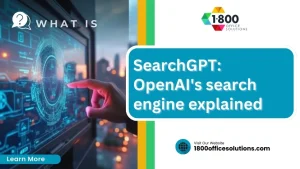What Is Enterprise AI? An in-Depth Guide for Businesses
Understanding what Enterprise AI is can significantly impact revenue growth and operational efficiency. This guide will explore the core components of Enterprise AI, how organizations are implementing these technologies for enhanced collaboration, and the associated risks, including fraud concerns. By engaging with this content, readers will gain valuable insights that can help them navigate and leverage AI tools effectively, addressing challenges they may face in adopting this transformative technology.
What Is Enterprise AI?

Enterprise AI refers to the integration of artificial intelligence into business operations, aimed at enhancing decision-making and efficiency. Key characteristics of Enterprise AI solutions include robust infrastructure, data security, and the use of advanced techniques like natural language processing. This guide will explore how these elements meet the growing demand for innovation in various sectors, including agriculture.
Defining Enterprise AI in Modern Business Context
Enterprise AI embodies a strategic approach to incorporating artificial intelligence in business management, particularly focusing on operational efficiency. By utilizing a well-designed user interface, organizations can streamline workflows, automate tasks, and improve decision-making processes. Many businesses are now exploring prototypes of AI solutions that tackle specific challenges, enhancing overall productivity and resource management.
This integration allows companies to leverage vast amounts of data to drive insights, significantly reducing time spent on manual processes. For instance, by adopting AI-driven tools found in relevant ebooks, businesses can refine their operations, making informed decisions that lead to better outcomes. As the demand for innovative solutions grows, understanding and implementing Enterprise AI will be essential for organizations aiming to maintain a competitive edge in their respective industries.
Key Characteristics of Enterprise AI Solutions
Key characteristics of Enterprise AI solutions include their ability to enhance customer relationship management by utilizing data analytics for improved customer insights. For example, when integrated with platforms like Google Cloud, these solutions can leverage machine learning to forecast customer behaviors and preferences, enabling businesses to tailor their strategies effectively. This alignment of technology and data allows organizations to create workflows that are not only efficient but also predictive, enhancing overall service delivery.
Another vital aspect of Enterprise AI is its focus on continuous learning, which transforms the way businesses interact with technology. By implementing AI tools, organizations can automate repetitive tasks and improve decision-making processes based on real-time data analysis. This not only streamlines operations but also frees up resources for more strategic initiatives, helping businesses maintain a competitive advantage in fast-paced market environments.
Core Components of Enterprise AI

Core components of Enterprise AI include machine learning and robust data management. Machine learning, often facilitated by platforms such as Nvidia DGX, plays a critical role in process optimization across sectors like manufacturing and human resources. Effective data governance ensures reliable analytics, enabling businesses to leverage energy-efficient AI solutions for enhanced operational efficiency and decision-making.
Machine Learning and Its Role in Enterprise AI
Machine learning serves as a foundational tool within the architecture of Enterprise AI, enabling businesses to improve knowledge management and operational efficiency. By analyzing large datasets, businesses can drive insights that enhance decision-making processes, particularly in the supply chain sector. For instance, leveraging machine learning algorithms allows companies to better predict inventory needs, thus optimizing stock levels and reducing waste.
Moreover, machine learning empowers organizations to automate various workflows, making it easier to manage information and resources effectively. As businesses integrate these advanced tools into their operations, they can expect improved accuracy in forecasting and enhanced responsiveness to market changes. This strategic implementation of machine learning not only facilitates seamless operations but also significantly elevates overall business performance.
Data Management and Governance in Enterprise AI
Data management and governance are critical components of Enterprise AI, ensuring that businesses can effectively utilize vast amounts of information while maintaining integrity and security. Implementing a solid governance framework allows organizations to manage the complexity of their data landscape, particularly when integrating AI capabilities like speech recognition and image processing. This strategy not only safeguards sensitive information but also enhances the quality of insights derived from AI systems, driving informed decision-making across departments.
Moreover, effective data governance promotes a culture of accountability and transparency within organizations. By establishing clear policies and protocols, businesses can ensure compliance and align their data management practices with overall corporate strategy. This approach mitigates risks associated with data misuse and enhances operational efficiency, allowing companies to leverage their AI tools more effectively and foster innovation in their processes.
How Enterprises Are Implementing AI Technologies

Companies are increasingly adopting enterprise AI solutions to drive innovation and optimize operations. Case studies illustrate successful integration of AI technologies, showcasing the benefits of tools like Kubernetes in streamlining software deployment. However, organizations often encounter challenges in implementing these technologies, including data management and system compatibility issues. This section will explore both successful implementations and the obstacles businesses face in their AI journey.
Case Studies of Successful Enterprise AI Integration
Several organizations have successfully integrated enterprise AI to enhance operational efficiency. For example, a global manufacturing company utilized machine learning algorithms within their enterprise systems to improve predictive maintenance. This allowed them to minimize downtime and manage operational risks more effectively, leading to significant cost savings and a more streamlined production process.
In another instance, a financial services firm adopted AI technologies to comply with regulatory requirements while optimizing their risk management practices. By leveraging data analytics and powerful machine learning tools, the firm significantly improved its ability to detect fraudulent activities in real-time. This integration not only increased the efficiency of their operations but also strengthened their compliance measures, reinforcing a culture of accountability and protection within the organization.
Challenges Faced in Implementing Enterprise AI
Implementing Enterprise AI presents various challenges for organizations across different sectors, including finance. One significant hurdle is the need for effective data cleansing, which is essential for ensuring the accuracy and reliability of the information being processed. Businesses often struggle with inconsistencies in data formats and quality, making it difficult to leverage advanced AI tools for productivity enhancements. As firms aim to adopt AI solutions, addressing these data integrity issues becomes pivotal for successful implementation.
Another challenge lies in the requirement for robust infrastructure, such as supercomputers, to support the intensive processing needs of AI applications. Organizations need to ensure their systems can handle the demands of advanced algorithms, specifically for tasks like information retrieval. Without proper resources and planning, enterprises may face bottlenecks that impair operational efficiency and limit the potential benefits of AI technologies. Addressing these infrastructural demands is crucial for companies striving to harness the full power of Enterprise AI.
Benefits of Enterprise AI for Organizations

Enterprise AI plays a vital role in enhancing decision-making processes and improving operational efficiency within business operations. By leveraging advanced technologies and information management, organizations can streamline customer interactions and optimize workflows. These elements not only facilitate better outcomes but also enable businesses to make data-driven decisions, reinforcing the integral value of AI in today’s competitive landscape.
Enhancing Decision-Making Processes
Enterprise AI, particularly through the integration of machine learning, significantly enhances decision-making processes by providing businesses with advanced data analysis capabilities. For instance, organizations can use AI to improve demand forecasting, allowing them to predict customer needs more accurately. This capability not only optimizes inventory management but also ensures that businesses are prepared to meet market fluctuations efficiently.
Incorporating solutions such as Red Hat can further bolster scalability, enabling businesses to adjust their operations in response to real-time data insights. This adaptability is crucial for organizations competing in dynamic markets, as it helps them make timely, informed decisions that drive operational efficiency and bolster overall performance. By leveraging these advanced technologies, companies can enhance their strategic focus and improve response times to market changes.
Improving Operational Efficiency
Enterprise AI enhances operational efficiency by enabling organizations to manage unstructured data more effectively. With advanced analytics, businesses can extract valuable insights from diverse data sources, allowing them to optimize resource allocation and streamline processes. For example, automating information retrieval can reduce the time spent on manual tasks, freeing employees to focus on strategic activities that foster creativity and innovation.
Additionally, implementing strong data governance frameworks supported by AI technologies can improve risk management practices. By ensuring data accuracy and compliance, organizations can minimize errors and make more informed decisions. This reliability not only boosts overall operational performance but also positions businesses to respond swiftly to market changes, driving sustained growth and efficiency.
Evaluating the Risks Linked to Enterprise AI

Evaluating the risks linked to Enterprise AI encompasses crucial considerations such as addressing ethical concerns in AI utilization and navigating security and compliance challenges. This section will delve into how these factors relate to the overarching goal of leveraging analytics and knowledge through AI systems, as well as exploring MLOps and the potential role of platforms like ServiceNow in mitigating risks while enhancing operational efficiency.
Addressing Ethical Considerations in AI Use
Addressing ethical considerations in AI use is paramount for businesses aiming for trust and integrity in their operations. As organizations leverage enterprise software and data centers for business transformation, transparency in AI decision-making processes becomes essential. Companies must ensure that their AI systems, often outlined in white papers, adhere to ethical standards, prioritizing fairness and accountability to establish trustworthy AI solutions.
Moreover, businesses should proactively engage in dialogues regarding the ethical implications of AI technology. This includes assessing the potential biases embedded within algorithms and their impact on decision-making processes. By prioritizing ethical practices, organizations not only enhance their reputation but also align their AI initiatives with broader social responsibilities, ultimately driving sustainable business growth.
Security and Compliance Challenges in Enterprise AI
Security and compliance challenges in Enterprise AI are increasingly critical for businesses aiming to maintain a competitive advantage while navigating complex regulations. Organizations must ensure that their AI frameworks align with regulatory compliance, particularly in sectors such as finance, where issues like money laundering pose significant risks. For instance, companies leveraging AI tools from IBM must implement robust security measures and adhere to industry standards to prevent data breaches and ensure the integrity of their AI-driven processes.
Moreover, organizations face the challenge of safeguarding sensitive data while meeting compliance requirements. Employing data scientists trained in ethical AI practices can help mitigate risks associated with data misuse and enhance the security of AI systems. By prioritizing compliance and security, businesses not only protect themselves but also enhance their reputation and foster trust with clients, ultimately leading to sustainable growth in an increasingly regulated environment.
The Future Trends of Enterprise AI

Innovations are driving Enterprise AI forward, influencing its adoption across various sectors. This section examines the significant advancements, including the development of more sophisticated computer programs and improvements in data transparency. Furthermore, predictions for Enterprise AI in the coming years will highlight the necessity for organizations to enhance their understanding of AI technologies and their potential impact on business operations.
Innovations Driving Enterprise AI Forward
Innovations in Enterprise AI are increasingly leveraging the power of the internet to enhance personalization and predictive maintenance across various industries. By utilizing platforms like Cloudera, businesses can harness vast amounts of data to create tailored customer experiences and improve operational efficiencies. These technological advancements enable organizations to predict equipment failures before they occur, allowing for proactive maintenance strategies that minimize downtime and reduce costs.
Research into advanced machine learning algorithms continues to drive these innovations, enabling firms to gain deeper insights from data analytics. As companies invest in these AI solutions, they not only enhance their performance but also adapt more swiftly to changing market conditions. This forward-thinking approach allows businesses to stay ahead in a competitive landscape, ensuring they meet customer expectations and optimize their resources effectively.
Predictions for Enterprise AI in the Coming Years
As companies continue to invest in enterprise AI, the integration of advanced algorithms with cloud computing will drive significant advancements in business operations. This synergy will enable organizations to leverage vast datasets, providing personalized customer experiences while streamlining processes. As a result, businesses will become more agile, able to respond effectively to market changes and customer demands, ultimately enhancing overall operational efficiency.
Looking ahead, enterprises will increasingly utilize AI technologies to optimize decision-making frameworks, allowing for real-time analysis and predictive capabilities. Firms that wish to stay competitive should consider strategies that incorporate these developments, and they may want to request a demo of leading solutions that highlight analytics and performance improvements. By adopting intel-driven approaches, organizations can ensure they remain at the forefront of innovation while addressing the evolving needs of their stakeholders.
Conclusion
Enterprise AI represents a transformative force in business operations, driving efficiency and informed decision-making. Organizations that embrace these advanced technologies can harness vast data resources, streamline workflows, and improve customer interactions, positioning themselves for sustained success. Understanding the core components and benefits of Enterprise AI is crucial for companies aiming to remain competitive and innovative. By integrating AI solutions, businesses not only enhance operational performance but also better navigate the complexities of today’s market landscape.











